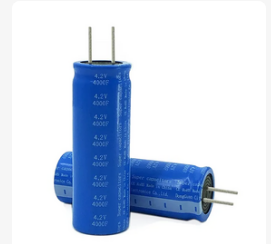Understanding Automotive Capacitors and Their Role in Modern Vehicles

Automotive capacitors are essential components in today’s advanced vehicles, playing a critical role in ensuring electrical efficiency and performance. While they might not be as widely recognized as batteries or engines, their importance in the functioning of automotive systems is undeniable. This article explores what automotive capacitor are, their functionality, and their applications in the automotive industry.
What Are Automotive Capacitors?
A capacitor is an electronic device that stores and releases electrical energy rapidly. Unlike a battery, which provides a steady supply of energy over time, a capacitor charges and discharges in short bursts. Automotive capacitors are specifically designed to endure the harsh environments typical of vehicles, including extreme temperatures, vibrations, and high humidity levels.
These automotive capacitor are made using durable materials such as ceramic, aluminum electrolytic, or tantalum, ensuring reliability and longevity in varying operational conditions. Their design allows them to meet strict automotive standards and maintain optimal performance in critical systems.
Functions of Automotive Capacitors
Automotive capacitors serve several key functions that contribute to the reliability and efficiency of modern vehicles. Some of the most notable functions include:
1. Electrical Energy Storage and Release
One of the primary functions of capacitors is to store electrical energy and release it when needed. This is especially important in electrical systems where a sudden burst of energy is required, such as during the ignition process or while operating high-powered components like air conditioners and infotainment systems.
2. Voltage Stabilization
Automotive systems often encounter voltage fluctuations caused by various loads, such as headlights being turned on or the engine starting. Capacitors help stabilize these voltage levels, protecting sensitive components like microcontrollers, sensors, and electronic control units (ECUs) from damage.
3. Noise Suppression
Many electrical systems within vehicles produce electromagnetic interference (EMI) that can disrupt other systems. Capacitors are used to suppress noise and filter out unwanted frequencies, ensuring smooth operation of radios, navigation systems, and other electronic components.
Applications of Automotive Capacitors
Due to their versatility, capacitors are used in a wide range of automotive applications. A few examples include:
1. Electric Vehicles (EVs) and Hybrid Vehicles
Electric and hybrid vehicles rely heavily on capacitors to manage the charge and discharge cycles in their power systems. Capacitors also help efficiently balance and distribute energy within the battery packs, contributing to improved vehicle performance and extended battery life.
2. Advanced Driver Assistance Systems (ADAS)
ADAS, which includes features like lane-keeping assistance, adaptive cruise control, and collision warnings, requires precise and rapid processing of data. Capacitors ensure the reliable functioning of the sensors and microprocessors that power these systems.
3. Fuel Injection Systems
Capacitors play a vital role in ensuring fuel-efficient performance. They regulate the electrical pulses controlling fuel injectors, ensuring the consistent and precise delivery of fuel to the engine.
4. Lighting Systems
Modern automotive lighting systems, such as LED headlights, depend on capacitors to manage power fluctuations and provide consistent performance.
The Importance of Quality in Automotive Capacitors
Choosing high-quality automotive capacitors is essential due to the demanding environments in which vehicles operate. A reliable capacitor helps maintain the efficiency, durability, and safety of automotive systems. Manufacturers continuously innovate and refine capacitor technology to meet the growing requirements of advanced vehicles.
By providing efficient energy storage, voltage stabilization, and noise suppression, automotive capacitors contribute to the seamless operation of modern vehicles. Their role is only expected to grow as the automotive industry continues to evolve with electrification and connectivity at the forefront. Every capacitor, small as it may seem, is a critical component in driving innovation and performance.
